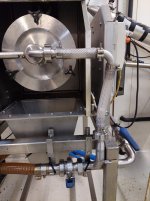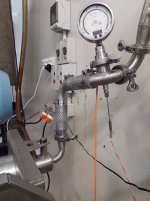one of the debates is how much should we grease the centrifuge's unions. the standard instructions is to grease them weekly if not daily.
last year i got asked by someone who used to sell them (and other high end industrial gear)
"why are you greasing them so much? your only greasing the bearings and they should be good for months if not years".
so i looked up manufactures instructions. i can't find this exact one but all others of the same type of union all say the same thing.
"connect with flexible hose"
"do not hard pipe"
"do not put union under strain"
"use two hoses at 90 degrees to each other"
so thats what i crudely put together over winter, with the space issues to contend with.


so this has been under test this season. the outlet is now fixed to the stand (by a hose clamp!) instead of hanging all that weight off the union and food grade pressure flex pipe used.
the inlets union has quite a lot of run out, but with the flexible pipes it doesn't matter.
the result is basically we have gone a couple of months without greasing with no issues. also the weird vibration issue which restricted rpm has gone.
so this begs the question as to whats happening.
my theory at the moment is that greasing the bearings packs in grease which hydraulics the bearings into a straight position. because the bearings are next to each other they take very little slop/wear for them to go slightly out of alignment. as the grease comes out with use, the bearings start getting slightly sloppy and that makes the seals go out of alignment and start makes noises. then you pump grease in to hydraulic the bearing straight, the noise goes away.
the main reason for the bearings going out of alignment is the large amount of weight and strain placed on the unions by the pipe work (filled with heavy honey).
by fitting flexible hoses its taking the load off the bearings , it removes the strain and the bearings stay in alignment which keeps the seals in alignment. that removes the need to constantly grease the bearings.
hope that helps you guys out there.
last year i got asked by someone who used to sell them (and other high end industrial gear)
"why are you greasing them so much? your only greasing the bearings and they should be good for months if not years".
so i looked up manufactures instructions. i can't find this exact one but all others of the same type of union all say the same thing.
"connect with flexible hose"
"do not hard pipe"
"do not put union under strain"
"use two hoses at 90 degrees to each other"
so thats what i crudely put together over winter, with the space issues to contend with.


so this has been under test this season. the outlet is now fixed to the stand (by a hose clamp!) instead of hanging all that weight off the union and food grade pressure flex pipe used.
the inlets union has quite a lot of run out, but with the flexible pipes it doesn't matter.
the result is basically we have gone a couple of months without greasing with no issues. also the weird vibration issue which restricted rpm has gone.
so this begs the question as to whats happening.
my theory at the moment is that greasing the bearings packs in grease which hydraulics the bearings into a straight position. because the bearings are next to each other they take very little slop/wear for them to go slightly out of alignment. as the grease comes out with use, the bearings start getting slightly sloppy and that makes the seals go out of alignment and start makes noises. then you pump grease in to hydraulic the bearing straight, the noise goes away.
the main reason for the bearings going out of alignment is the large amount of weight and strain placed on the unions by the pipe work (filled with heavy honey).
by fitting flexible hoses its taking the load off the bearings , it removes the strain and the bearings stay in alignment which keeps the seals in alignment. that removes the need to constantly grease the bearings.
hope that helps you guys out there.


